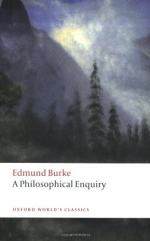
|
| Name: _________________________ | Period: ___________________ |
This quiz consists of 5 multiple choice and 5 short answer questions through Part I.
Multiple Choice Questions
1. What does Burke warn his readers about in the Second Preface?
(a) His book will challenge their core values.
(b) His book will contain faults.
(c) His book may be construed as unpatriotic.
(d) His book may make them angry.
2. Which method of teaching does Burke think best?
(a) Testing the learner on the subject.
(b) Allowing the learner to investigate the subject.
(c) Lecturing the learner on the subject.
(d) Referring obliquely to the subject in conversation with the learner.
3. What natural powers in man does Burke say relate to external objects?
(a) The judgment, emotions, and the will.
(b) The imagination, passions, and the senses.
(c) The senses, passions, and the will.
(d) The senses, imagination, and judgment.
4. What does Burke note about youth, as related to taste?
(a) That youth is the province of true wisdom.
(b) That innocence does not equal ignorance.
(c) That although judgments may not be sound, taste is excellent.
(d) That sensory pleasure is great while judgment is inaccurate.
5. To which human faculty does "taste" belong?
(a) To the soul.
(b) To the imagination.
(c) To the will.
(d) To the passions.
Short Answer Questions
1. In what year was "A Philosophical Enquiry Into the Origin of Our Ideas of the Sublime and Beautiful" first published?
2. Why does Burke offer a second edition of "A Philosophical Enquiry Into the Origin of Our Ideas of the Sublime and Beautiful"?
3. Why is imitation important, according to Burke?
4. Which two ideas does Burke often find confused with one another?
5. What two main passions connect with this creative power of the mind?
|
This section contains 336 words (approx. 2 pages at 300 words per page) |

|




